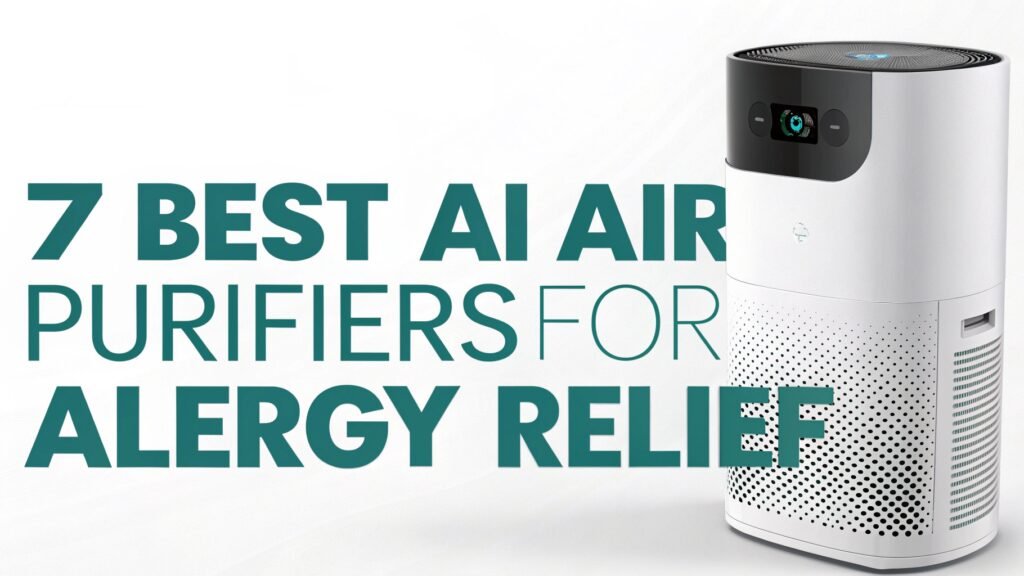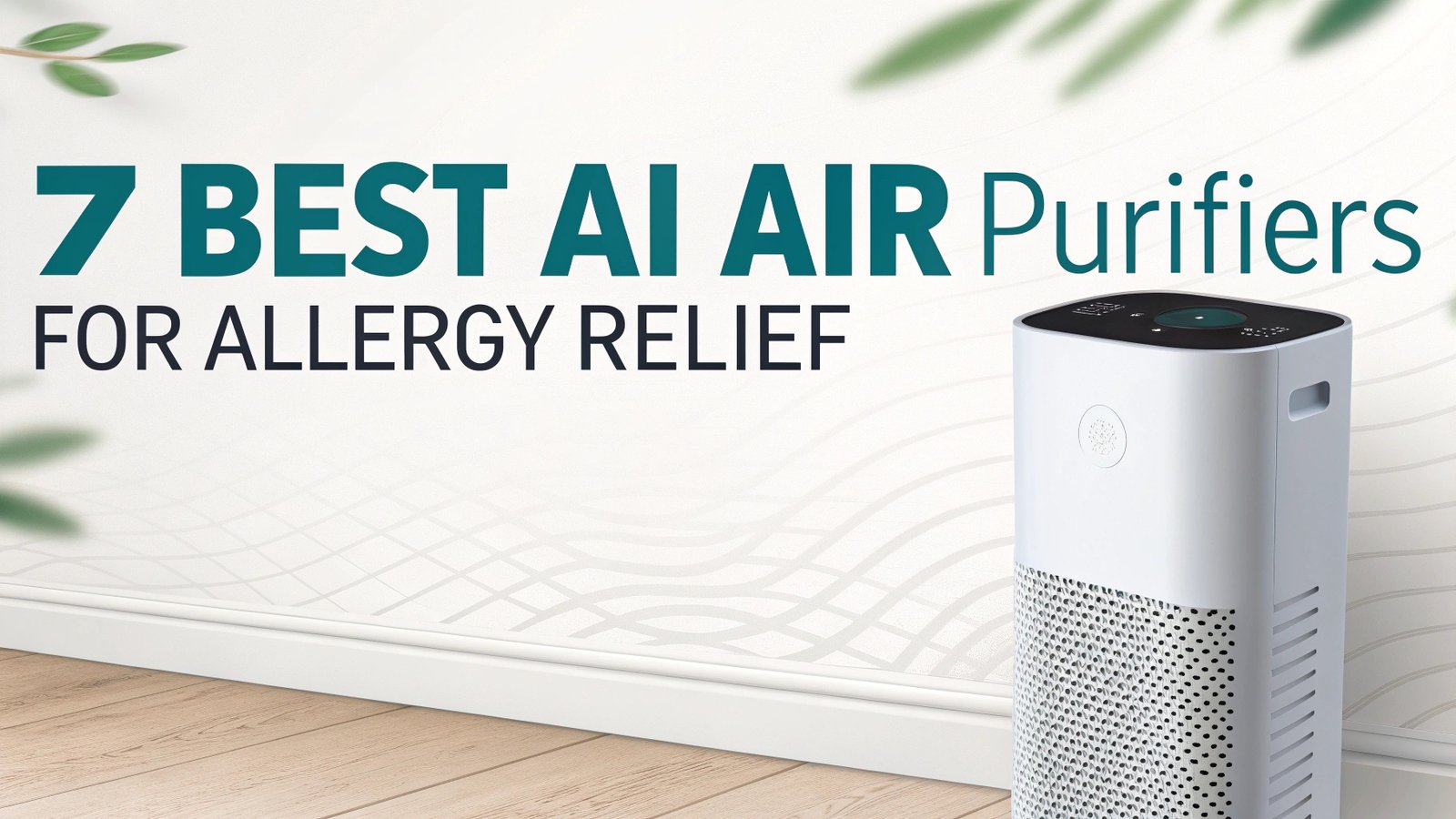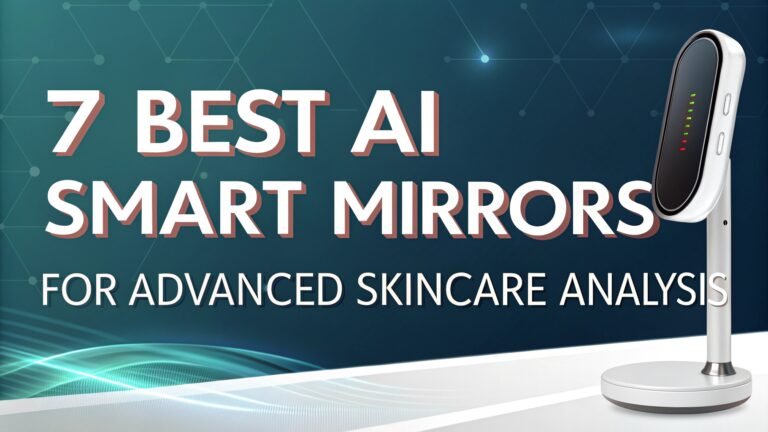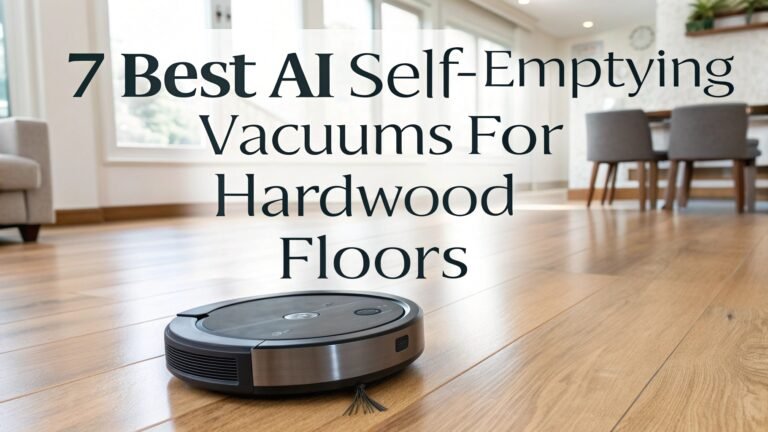7 Best AI Air Purifiers for Allergy Relief: Smart Technology
Allergies can turn your home from a sanctuary into a battleground. The constant sneezing, watery eyes, and stuffy nose make daily life miserable.
Traditional air purifiers help, but AI-powered air purifiers take indoor air quality to the next level.
These smart devices learn your habits, monitor air quality in real-time, and automatically adjust their performance to keep allergens at bay.

Key Takeaways:
- Smart sensors continuously monitor air quality and automatically adjust fan speeds based on pollution levels detected
- WiFi connectivity allows remote control through mobile apps, letting you manage air quality from anywhere in your home
- Voice control compatibility with Alexa and Google Assistant makes operation hands-free and convenient for allergy sufferers
- Real-time air quality displays show PM2.5 levels, helping you understand when allergen levels are highest
- Machine learning capabilities adapt to your daily routines and optimize purification schedules automatically
- Advanced filtration systems combine True HEPA filters with activated carbon and specialized allergy filters for maximum protection
Understanding Smart Air Purification Technology
AI air purifiers represent a significant advancement over basic models. These devices use sophisticated sensors to detect microscopic particles that trigger allergic reactions. Unlike traditional purifiers that run at fixed speeds, smart models automatically respond to changing conditions.
The intelligent monitoring systems track multiple air quality parameters simultaneously. They measure PM2.5 particles, volatile organic compounds, and even specific allergens like pollen. Advanced algorithms process this data to predict when air quality will decline and proactively increase filtration power.
Connected functionality transforms how you interact with your air purifier. Mobile apps provide detailed air quality reports, filter replacement reminders, and scheduling options. Some models even integrate with smart home ecosystems, allowing coordination with other devices like thermostats and humidity controllers. This seamless automation ensures optimal air quality without constant manual adjustments.
LEVOIT Core 600S Smart Air Purifier
The LEVOIT Core 600S stands out as one of the most capable AI air purifiers for large spaces. This powerhouse device covers up to 2,933 square feet, making it perfect for open floor plans and multi-room purification. The smart WiFi connectivity allows complete control through the VeSync app, where you can monitor real-time air quality, adjust settings, and receive maintenance alerts.
The three-stage filtration system captures 99.97% of particles as small as 0.3 microns. The pre-filter traps large particles like pet hair and dust, while the True HEPA filter eliminates microscopic allergens including pollen, mold spores, and dust mites. An activated carbon filter removes odors and volatile organic compounds that often accompany allergens.
Advanced sensors continuously monitor PM2.5 levels and display readings on the device’s color-coded screen. The Auto Mode automatically adjusts fan speeds based on detected air quality, ensuring efficient purification without wasting energy. Sleep Mode reduces noise to whisper-quiet levels while maintaining effective filtration throughout the night.
Pros:
- Covers exceptionally large areas up to 2,933 sq ft
- Real-time PM2.5 monitoring with color-coded display
- Smart app control with detailed air quality reports
- AHAM verified for performance and reliability
- Ultra-quiet sleep mode for bedroom use
Cons:
- Higher price point compared to smaller models
- Large size may not fit in compact spaces
- Replacement filters are more expensive due to size
Dyson Purifier Cool TP07 Smart Tower
The Dyson TP07 combines cutting-edge purification technology with elegant design. This tower-style purifier features 360-degree glass HEPA filtration that captures ultrafine particles and allergens from every angle. The sealed filtration system ensures no dirty air bypasses the filters, providing comprehensive allergen removal.
Smart sensing technology automatically detects and reports particle levels, nitrogen dioxide, and volatile organic compounds. The LCD display shows real-time air quality data, while the MyDyson app provides detailed pollution reports and remote control capabilities. Voice control compatibility with Alexa makes operation completely hands-free.
The Air Multiplier technology projects purified air throughout the room using precise airflow engineering. This ensures even distribution of clean air, eliminating dead zones where allergens might accumulate. The oscillation feature can be controlled remotely, directing airflow exactly where needed most.
Nighttime purification continues quietly with dimmed display and reduced noise levels. The programmable timer allows automatic operation based on your schedule, ensuring clean air when you need it most. Filter replacement indicators eliminate guesswork about maintenance timing.
Pros:
- 360-degree sealed HEPA filtration captures more allergens
- Detailed air quality reporting through mobile app
- Bladeless design is safe around children and pets
- Doubles as a cooling fan during warmer months
- Voice control integration for hands-free operation
Cons:
- Premium pricing compared to traditional designs
- Replacement filters are expensive
- May produce slight electrical smell initially
Coway Airmega 400S Smart Air Purifier
The Coway Airmega 400S brings professional-grade air purification to residential settings. This dual-sided air purifier processes air through two separate filtration systems simultaneously, dramatically increasing purification speed and efficiency. The smart technology learns your usage patterns and automatically optimizes performance.
Dual True HEPA filters work in tandem to capture allergens from multiple directions. The Max2 filter system combines HEPA filtration with activated carbon for comprehensive protection against particles and odors. This configuration removes 99.97% of particles down to 0.3 microns, including the smallest allergens that trigger symptoms.
Real-time air quality monitoring tracks pollution levels and adjusts operation automatically. The smart mode increases or decreases fan speed based on detected particle concentrations, maintaining optimal air quality while conserving energy. LED indicators provide instant visual feedback about current air quality status.
The IoCare mobile app offers complete remote control and monitoring capabilities. You can check air quality from anywhere, receive filter replacement alerts, and schedule operation times. Amazon Alexa compatibility enables voice commands for convenient hands-free control during allergy flare-ups.
Pros:
- Dual-sided filtration for faster air cleaning
- Smart learning algorithms optimize performance
- Covers large areas up to 1,560 square feet effectively
- Energy Star certified for efficient operation
- Comprehensive mobile app with detailed analytics
Cons:
- Bulkier design requires more floor space
- Dual filters increase replacement costs
- May be overpowered for smaller rooms
LEVOIT Core 200S Smart Compact Air Purifier
The LEVOIT Core 200S proves that smart air purification doesn’t require massive devices. This compact powerhouse delivers intelligent allergen control for bedrooms, offices, and smaller living spaces. Despite its small footprint, the Core 200S incorporates advanced sensors and smart connectivity features typically found in larger models.
Three-stage filtration efficiently captures allergens in a space-saving design. The washable pre-filter removes larger particles like pet hair and lint, while the True HEPA filter eliminates 99.97% of airborne allergens including pollen, dust mites, and mold spores. The activated carbon filter neutralizes odors that often accompany allergenic particles.
Smart connectivity through the VeSync app enables complete remote control and monitoring. Real-time air quality data helps you understand pollution patterns in your space, while scheduled operation ensures clean air during peak allergy hours. The app sends notifications when filters need replacement, eliminating maintenance guesswork.
Sleep Mode optimization maintains effective filtration while reducing noise to barely audible levels. The display auto-dimming prevents light disruption during nighttime operation. Timer functions allow automatic shutoff or startup based on your daily routine, ensuring optimal air quality when you’re present.
Pros:
- Compact size perfect for bedrooms and small spaces
- Full smart connectivity despite smaller size
- Very affordable price point for smart features
- Ultra-quiet operation ideal for sleep areas
- Easy filter replacement with clear indicators
Cons:
- Limited coverage area compared to larger models
- Lower air processing speed for heavily polluted environments
- Basic particle sensor compared to premium models
WINIX C610 360-Degree Smart Air Purifier
The WINIX C610 revolutionizes air purification with its unique 360-degree intake design. This innovative approach draws air from all directions simultaneously, creating more efficient particle capture than traditional single-directional models. The PlasmaWave technology adds an extra layer of protection by neutralizing allergens at the molecular level.
Four-stage filtration provides comprehensive allergen removal through multiple mechanisms. The 360-degree True HEPA filter captures particles from every angle, while the activated carbon filter eliminates odors and chemical pollutants. PlasmaWave technology breaks down allergens and pollutants into harmless components without producing ozone.
Smart WiFi connectivity enables complete control through the WINIX mobile app. Real-time air quality monitoring displays current pollution levels and provides historical data to help identify allergen patterns. Auto mode automatically adjusts fan speeds based on detected air quality, optimizing performance while minimizing energy consumption.
Voice control compatibility with Alexa and Google Assistant allows hands-free operation when allergy symptoms make movement difficult. Sleep mode reduces noise and dims displays while maintaining effective overnight purification. The filter replacement indicator ensures optimal performance by alerting you exactly when maintenance is needed.
Pros:
- Unique 360-degree design captures more airborne allergens
- PlasmaWave technology provides additional allergen neutralization
- Comprehensive mobile app with air quality analytics
- Voice control compatibility for convenient operation
- AHAM verified performance rating for reliability
Cons:
- PlasmaWave feature may concern some users
- Cylindrical design requires specific placement considerations
- Higher-end features reflect in premium pricing
AMEIFU Smart WiFi Air Purifier
The AMEIFU Smart Air Purifier delivers impressive coverage and intelligent features at an accessible price point. This large room specialist effectively purifies spaces up to 2,400 square feet, making it ideal for open living areas, basements, and multi-room applications. The washable pre-filter reduces ongoing maintenance costs while maintaining excellent allergen capture.
Advanced filtration technology combines multiple layers of protection against allergens. The washable pre-filter captures large particles and extends the life of subsequent filters, while the True HEPA filter removes 99.97% of microscopic allergens. The activated carbon layer eliminates odors and volatile organic compounds that often accompany seasonal allergies.
Smart WiFi connectivity through the dedicated mobile app provides comprehensive control and monitoring capabilities. Real-time PM2.5 monitoring displays current air quality levels, helping you understand when allergen concentrations are highest. The color-coded display provides instant visual feedback about air quality status throughout the day.
Automatic operation modes adjust purification intensity based on detected pollution levels. Sleep mode reduces fan speeds and dims displays while maintaining effective nighttime purification. The timer function allows scheduled operation, ensuring clean air during peak allergy hours without constant manual adjustment.
Pros:
- Exceptional coverage area up to 2,400 square feet
- Washable pre-filter reduces long-term operating costs
- Real-time PM2.5 display with color-coded indicators
- Comprehensive mobile app with remote control
- Competitive pricing for large room coverage
Cons:
- Less established brand compared to major manufacturers
- Limited customer service network
- Filter availability may vary in some regions
SereneLife Smart HEPA Air Purifier
The SereneLife Smart Air Purifier represents exceptional value in intelligent air purification technology. This ultra-quiet performer combines essential smart features with reliable allergen removal at a budget-friendly price point. The 1,800 square foot coverage makes it suitable for most homes while maintaining whisper-quiet operation.
Three-stage filtration efficiently removes allergens through proven technology. The pre-filter captures larger particles like pet hair and dust, extending the life of subsequent filters. The True HEPA filter eliminates 99.97% of microscopic allergens, while the activated carbon filter removes odors and chemical pollutants that can trigger sensitivities.
Smart WiFi connectivity enables complete control through the mobile app interface. Real-time air quality monitoring helps identify when allergen levels increase, allowing proactive purification management. Auto mode automatically adjusts fan speeds based on detected particle concentrations, maintaining optimal air quality efficiently.
Ultra-quiet operation makes this purifier ideal for bedrooms and noise-sensitive environments. Sleep mode further reduces operational noise while maintaining effective allergen removal throughout the night. The compact design fits easily into most spaces without dominating room aesthetics.
Pros:
- Exceptional value for smart air purification features
- Ultra-quiet operation perfect for bedrooms
- Amazon’s Choice recognition for reliability
- Covers large areas up to 1,800 square feet
- Simple mobile app interface easy to navigate
Cons:
- Basic air quality sensors compared to premium models
- Limited advanced features for tech enthusiasts
- Fewer filter options compared to major brands
Smart Features That Make a Difference
Artificial intelligence in air purifiers extends far beyond basic automation. Modern AI systems learn from your daily routines, seasonal patterns, and local air quality data to optimize performance proactively. These systems can predict allergen spikes before they occur, automatically increasing filtration power during high pollen days or when pollution levels rise.
Machine learning algorithms analyze usage patterns to create personalized purification schedules. They identify when you’re typically home, which rooms you use most, and how external factors affect indoor air quality. This predictive capability ensures optimal air quality without manual intervention, making life easier for allergy sufferers who need consistent protection.
Integration capabilities allow AI air purifiers to work with other smart home devices. They can coordinate with weather apps to increase filtration before storms that stir up allergens, or work with smart thermostats to optimize air circulation. Some models even integrate with health apps to track symptom patterns and adjust purification accordingly.
Energy Efficiency and Smart Operation
Smart energy management helps AI air purifiers operate efficiently while maintaining excellent allergen control. Advanced sensors detect when rooms are unoccupied and automatically reduce fan speeds, saving energy without compromising air quality. Eco modes optimize performance based on current air quality conditions rather than running at maximum power constantly.
Predictive maintenance features monitor filter condition and usage patterns to provide accurate replacement timing. This prevents decreased performance due to clogged filters while avoiding premature replacements that waste money. Smart scheduling ensures purifiers operate during optimal times, such as before you arrive home or during peak allergen hours.
Cost-effective operation results from intelligent power management that adjusts performance based on actual needs rather than assumptions. Sleep mode optimization maintains effective purification while minimizing energy consumption and noise during nighttime hours.
Installation and Setup Considerations
Optimal placement significantly impacts AI air purifier effectiveness for allergen control. Smart models often include placement guidance through their mobile apps, using room dimensions and airflow patterns to recommend ideal positioning. Proper placement ensures maximum allergen capture while allowing sensors to accurately monitor air quality.
WiFi connectivity setup typically requires a strong signal in the purifier’s location. Most smart purifiers include connection diagnostics to help troubleshoot connectivity issues. Stable internet connection ensures reliable remote monitoring and control capabilities that make smart purifiers so valuable for allergy management.
Initial calibration allows AI systems to establish baseline air quality readings for your specific environment. This learning period typically lasts several days as sensors adapt to your home’s unique conditions and establish normal operating parameters. Patient initial setup results in more accurate long-term performance.
Maintenance and Filter Management
Smart filter monitoring eliminates guesswork about replacement timing by tracking actual usage and air quality conditions. AI systems calculate filter life based on particle load rather than simple time intervals, ensuring optimal performance while avoiding unnecessary replacements. Mobile apps provide detailed filter status and easy reordering capabilities.
Predictive maintenance alerts warn about declining performance before it affects allergen control. Usage analytics help identify patterns that might require filter changes more or less frequently than average. Some systems even adjust operation to extend filter life during low-pollution periods.
Quality replacement filters ensure continued effectiveness against allergens. AI systems often verify filter authenticity and compatibility, preventing performance degradation from substandard replacements. Subscription services can automate filter deliveries based on actual usage patterns rather than fixed schedules.
Comparing Smart vs Traditional Air Purifiers
Intelligence advantages make smart air purifiers significantly more effective for allergy relief than traditional models. Continuous monitoring ensures optimal performance adjustments throughout the day, while traditional purifiers rely on manual speed selections that may not match current allergen levels. Predictive operation allows smart models to increase filtration before allergen concentrations spike.
Convenience factors dramatically improve the user experience for allergy sufferers. Remote control capabilities allow adjustments from bed during nighttime allergy flares, while voice control enables hands-free operation when symptoms make movement difficult. Automated scheduling ensures consistent air quality without daily manual management.
Long-term value often favors smart purifiers despite higher initial costs. Energy efficiency from intelligent operation reduces electricity costs, while optimized filter usage prevents premature replacements. Performance monitoring ensures consistent allergen control that may reduce medical expenses related to allergy symptoms.
Frequently Asked Questions
Do AI air purifiers really work better for allergies than regular models?
AI air purifiers provide superior allergy relief through intelligent monitoring and automatic adjustments. Regular purifiers operate at fixed speeds regardless of current allergen levels, while AI models continuously monitor particle concentrations and adjust performance accordingly. Smart sensors detect allergen spikes before you notice symptoms, automatically increasing filtration power when protection is needed most. Predictive algorithms can even anticipate allergen increases based on weather patterns and seasonal data.
How do smart air purifiers connect to WiFi and what happens if the internet goes down?
Most smart air purifiers connect through 2.4GHz WiFi networks using WPA2 security protocols. Setup typically involves downloading the manufacturer’s app and following guided connection steps. If internet connectivity is lost, local operation continues with manual controls and automatic sensors still functioning. However, remote monitoring and control features become unavailable until connectivity is restored. Basic purification continues uninterrupted during internet outages.
Are the mobile apps for smart air purifiers user-friendly for seniors?
Modern air purifier apps prioritize simple, intuitive interfaces with large buttons and clear displays. Most feature basic controls prominently displayed on the main screen, with voice control options available for hands-free operation. Tutorial modes guide users through initial setup and common functions. However, complexity varies between manufacturers, so hands-on testing before purchase is recommended for users concerned about technology adoption.
How accurate are the air quality sensors in AI air purifiers?
Professional-grade sensors in quality AI air purifiers provide accuracy within 10-15% of laboratory-grade equipment for most particle measurements. PM2.5 sensors are generally most reliable, while VOC detection may vary more significantly. Regular calibration through normal operation improves accuracy over time as AI systems learn environmental patterns. However, medical-grade accuracy typically requires specialized equipment beyond consumer air purifiers.
Can smart air purifiers help with specific allergens like pet dander or pollen?
HEPA filtration in smart air purifiers captures 99.97% of particles including pet dander (typically 2.5-10 microns) and pollen (15-200 microns). Smart sensors can detect when these allergen levels increase and automatically boost filtration accordingly. Some advanced models include allergen-specific detection that can differentiate between particle types and adjust operation for optimal capture of specific allergens troubling individual users.
How much do replacement filters cost for smart air purifiers?
Filter costs vary significantly based on purifier size and filtration complexity, ranging from $30-150 per replacement set. Smart monitoring helps optimize filter life by adjusting operation based on actual particle load rather than time alone, potentially extending filter life by 20-30%. Subscription services often provide 10-15% discounts on replacement filters while ensuring timely delivery. Washable pre-filters in some models reduce overall replacement costs by extending main filter life.

I’m Liza, the founder and author of Liza AI Blog, where I share my passion for artificial intelligence through insightful guides and updates. I’m dedicated to making AI accessible to everyone, and I strive to create a community that’s both informed and engaged. Through my blog, I aim to promote a deeper understanding and appreciation of AI and its potential to shape our future. You can reach me at lizaaiblog@gmail.com or follow me on social media to stay updated on the latest AI news and trends.







